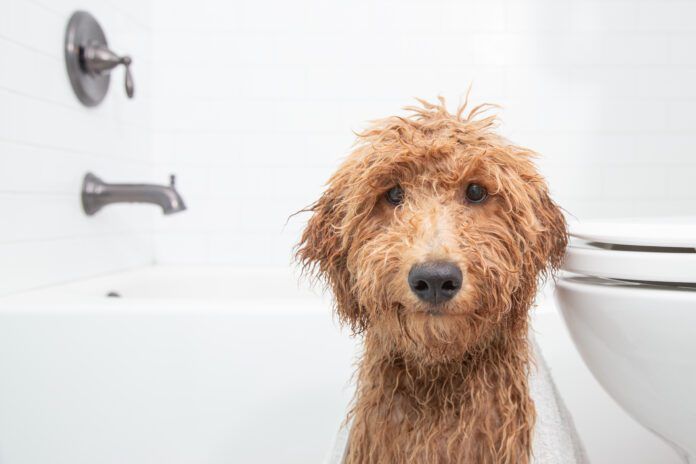Some dogs have a knack for rolling in disgusting, decaying, and dreaded guck. It usually happens when the pet supply shops and the groomer are closed and that bottle of dog shampoo you had in your cabinet is nearly empty.
You scratch your head and think, “What can I wash my dog with that isn’t dog shampoo?”
You start frantically rummaging through your house, looking for anything that might be a dog shampoo alternative, mumbling to yourself, “Hmmm, is Dawn dish soap safe for dogs? Is baby shampoo safe for dogs? Wait, can you use human shampoo on dogs?”
We surveyed the experts, and while you shouldn’t make a habit of it, you can use some of these products to wash your dog in case of a malodorous emergency. However, there are some caveats.
Here’s why: Human shampoo is formulated for humans. Dog shampoo is made for dogs. When you use a non-dog shampoo on your pooch, it could cause irritation, dandruff, or even skin ulcers that need medical attention.
“Dog skin is not as thick as human skin,” says veterinarian Mitzi Clark, an assistant clinical professor of dermatology at Cornell University College of Veterinary Medicine. “The outer layer of the skin is thinner in dogs, so it’s much easier to strip that outer layer of a dog’s skin and dry it out.”
And anything you use on a dog’s skin seeps into their system faster than it would in a human.
“It’s easier to penetrate the outer layer of a dog’s skin, the epidermis, and get to the dermis, which is the layer of skin that has the blood vessels where the ingredients could be absorbed into their system,” Dr. Clark says. “Dogs, in general, due to having thinner skin, just don’t have as much protection against the world as other species, including humans. It’s one of the reasons they probably have more issues with bacterial infections, allergies, and other diseases that predispose their skin to those conditions.”
So knowing dogs generally have more sensitive skin than humans, how should you answer the question: What can I wash my dog with that’s not dog shampoo? Here’s what you need to know.
Is Dawn Dish Soap Safe for Dogs?
Dawn dish soap is well known in animal rescue circles for working miracles. Rescuers use it to de-grease wild animals soaked in oil after spills and help dogs and cats covered in fleas and ticks. It’s also the main ingredient in a DIY skunk smell-removing shampoo.
“It’s a really potent degreaser, that’s why we use it to degrease our dishes,” Dr. Clark says. “It’s very stripping to a dog’s outer layer of skin, so the biggest issue is that it can be drying.”
But if you have a doggone disaster, Dawn dish soap is typically safe for dogs.
“It wouldn’t be something we would recommend doing weekly, or on an ongoing basis, or for a long time,” Dr. Clark says. “But if you have a situation where, ‘My dog just rolled on a dead animal,’ it’s something you could reach for in a pinch, and most animals are going to tolerate it fine.”
Avoid getting dish soap in your dog’s mouth, eyes, and ears. Their ear canals are more sensitive than their skin.
“Dilute the dish soap in some water first, so you can get more mileage out of it, rather than just slapping it on one section of the dog,” says extension veterinarian Aly Cohen from the Cornell University College of Veterinary Medicine. “Be sure to really, really rinse your dog thoroughly so you don’t have any leftover residue in the fur or the skin that could sit there and cause some irritation.”
Can You Use Human Shampoo on Dogs?
If you have a favorite shampoo that makes your hair glossy, shiny, and silky, that’s likely because it’s designed for humans. It might not do the same for your dog. Before you consider using human shampoo on dogs, check the ingredients.
“Some of the more natural products that contain essential oils can be a problem,” Dr. Clark says. “We’ve seen reactions to tea tree oil, citrus oil, and citronella oil. You have to be careful using shampoos with essential oils on dogs. Some of them can be quite harmful; those are things I would steer away from.”
Our experts also recommend steering clear of using human shampoos that contain parabens, phthalates, and formaldehyde on dogs.
“I would try to avoid anything that’s heavily fragranced with perfumes or extra scents,” Dr. Cohen says. “Those can be a little harsh, irritating, or sometimes even toxic, if they happen to ingest any of it.”
Can You Use Baby Shampoo on Dogs?
Is baby shampoo safe for dogs? You may think, “If it’s gentle enough to use on a baby, it must be OK for dogs, right?” Not necessarily.
“Baby shampoo will generally be a little bit milder than regular human shampoo,” Dr. Cohen says. “But they’re generally still formulated for human skin.”
Make sure the baby shampoo doesn’t contain any of the ingredients that can be harmful to dogs, which are sometimes found in human shampoos.
Before you dive into your cabinet looking for dog shampoo alternatives, remember that if your dog is covered in something that’s not oily, greasy, or smelly, you can just use water to rinse them off; no shampoo is needed. Unless dogs have a medical condition and need special shampoo and baths, they don’t typically need to be bathed regularly.
While not ideal, turning to dish soap, human shampoo, or baby shampoo when you have a putrid predicament may be the stink-reducing rescue potion you need; with the proper precautions, these products could work as dog shampoo substitutes. You may also be able to make your own dog shampoo from ingredients you have on hand.
Keep in mind that there’s no guarantee your dog won’t have a problem or reaction to any of these alternatives, even if you use shampoo made for dogs. Every dog and product is different.
“After using a new shampoo, keep an eye on them,” Dr. Clark says. “If they’re a little bit flaky, but the dog doesn’t care, fine. If they get red and irritated, they may need veterinary care. I think probably the most important takeaway is that even though dogs are family members, pet parents need to understand that their skin is different. Not everything safe for humans is necessarily safe for dogs.”







Just a general comment. I can always find answers and guidance on your site. Thanks for being a great resource!
IveI’found that pouring some tomatoe juice directly on the affecter area, rubbing it in, and immediately rinsing with plain water works well to de-stink the dog. Never had any adverse reactions.
I`m 71, which might help you understand this comment.
In the 60s, we hunted a lot with our bluetick coonhounds. It wasn’t uncommon for one of them to waller or roll in an old carcass of some animal and sometimes it wasn’t an animals carcass just something they wanted to do. However, at the end of it, they smelt terrible and sometimes you couldn’t get it off of them. We used tomato juice..
Another reason, my father used tomato juice with burnt oil for the mange. He would do this for at least two or three days depending on how severe the mange was. It worked every time.
Many of these old remedies from moons ago are some of the best. The only problem is some of the products are no longer made user-friendly.